Sudan timeline April-June 2024: Sudan war ‘remains overlooked by international community’
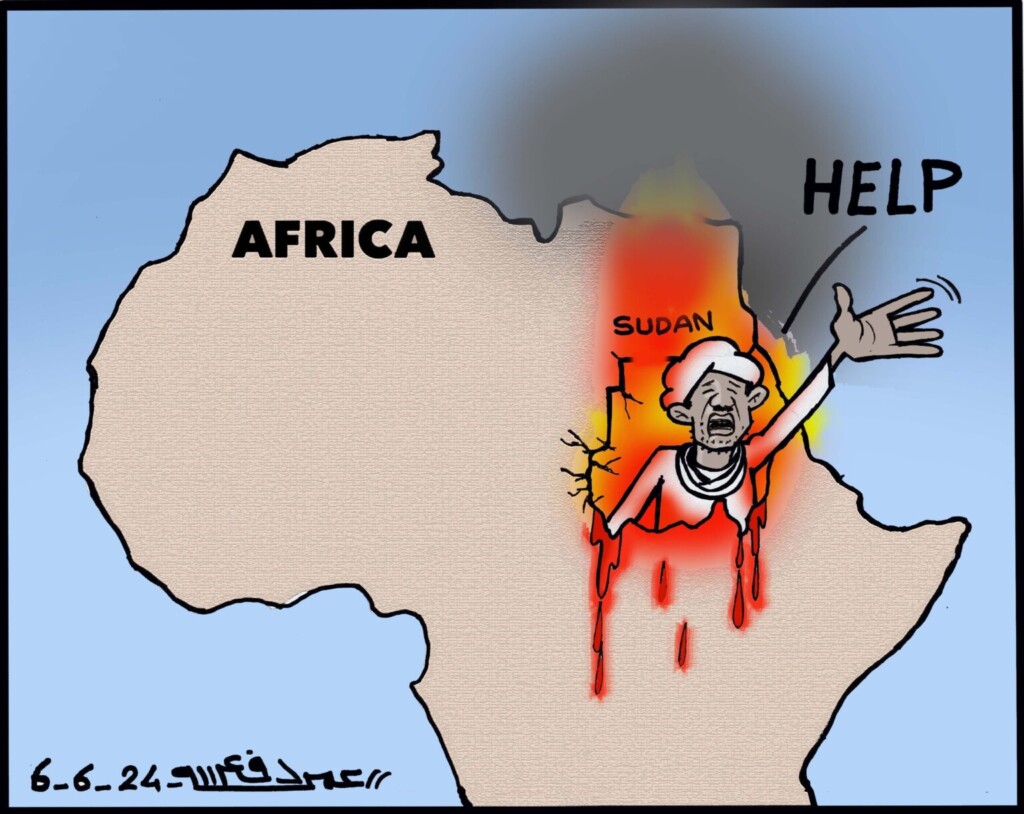
Help! (Cartoon by Omar Dafallah / RD)
On April 15, the war between Sudanese Armed Forces (SAF) and the paramilitary Rapid Support Forces (RSF) entered its second year. The continued fighting and attacks on civilians have taken a devastating human toll. The UN Humanitarian Coordinator for Sudan in mid-May urges the international community to give greater attention and resources to Sudan, where millions are “trapped in an inferno of brutal violence”.
The UN Inter-Agency Standing Committee on Sudan warns that ‘the clock is ticking … the choice is clear’. Other UN agencies predict that ‘Sudan risks a lost generation, with grave implications for the country’s future’.
The Paris Conference concludes on April 15 with governments pledging more than €2 billion to address the severe humanitarian crisis in Sudan. New international or regional attempts, however, to pressure the warring parties to enter negotiations, are not forthcoming. Governments release condemnation statements, sanction individuals and entities, as aid officials remain calling for more funds and a safe passage of aid.
April: By April 15, one year after the war between the SAF and its paramilitary counterpart, the RSF, erupted, no end of the fighting is in sight. Regional and international parties which in vain tried to bring the warring parties together for peace talks in 2023, seem to have given up hope. Statements denouncing the war and calling on the SAF and RSF to stop fighting remain. The RSF siege on El Fasher, the capital of North Darfur, and the last capital of the five Darfur states not occupied by the RSF, is discussed by the UN Security Council in ‘a closed session’. The United Arab Emirates (UAE) again strongly refutes Sudan’s ‘baseless accusations’ that Abu Dhabi is supplying the RSF with arms and pledges to donate millions of dollars for aid to the Sudanese.
April 1: Many families leave Kendebbe camp in West Darfur to seek safety and aid in Chad.
April 2: At least five members of the SAF-affiliated El Baraa bin Malik Brigade in River Nile state die in a drone attack. Sudan halts operations of Saudi and UAE state-owned channels. US Special Envoy for Sudan Tom Perriello condemns the civilian toll in the nearly one-year old war.
April 3: The Sudanese Air Force conduct more airstrikes across Darfur. People living in the Sakali camp for the displaced near Nyala, the capital of South Darfur, call for urgent aid. Members of the Darfur Bar Association meet the US Special Envoy to Sudan in the Egyptian capital of Cairo.
April 4: According to the Civil Democratic Forces (Tagadom) chaired by former PM Abdalla Hamdok, the charges filed in Port Sudan, the de facto capital of the country, against its leaders last week “will not affect communication between the alliance and the army leadership”.
April 5: Psychotherapists are treating traumatised people in nine Sudan states despite a “complete lack of health services”.
April 6: Armed men reportedly allied with the RSF kill more than 100 villagers in the area controlled by the Sudan People’s Liberation Movement-North under the leadership of Abdelaziz El Hilu (SPLM-N El Hilu) in South Kordofan. Social media activists call for a digital protest march under the slogan ‘This Country Belongs to Us’ at 19:00 Sudanese time.
April 7: The Sudan Media Forum group launches the #StandWithSudan campaign to address famine and human rights abuses. In the country.
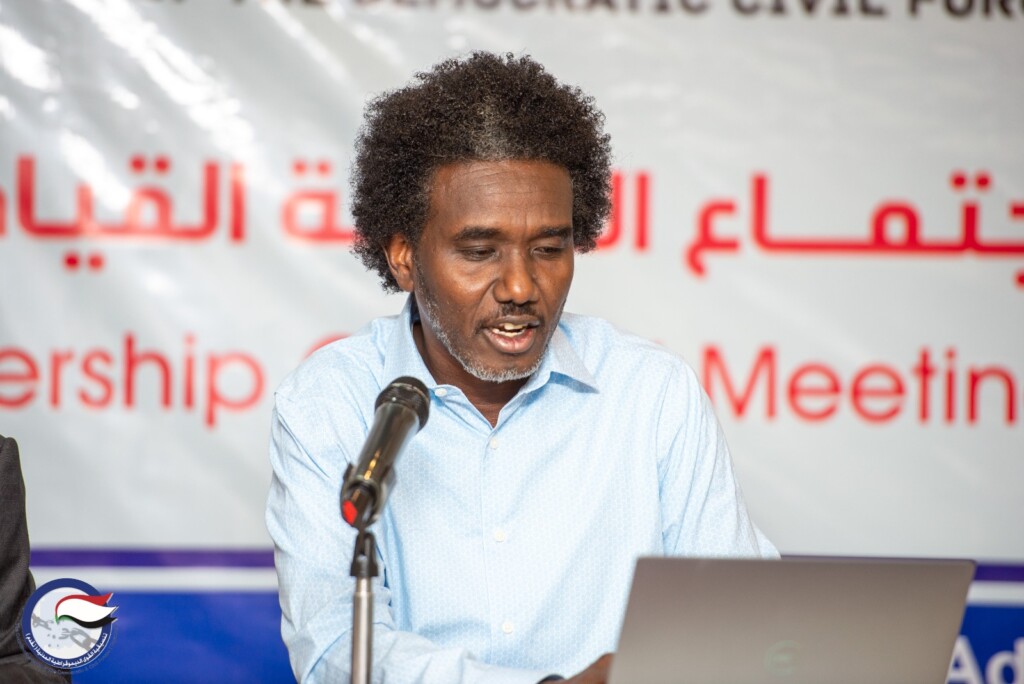
April 8: Battles between the SAF and RSF resume in El Gezira, drones attack El Gedaref. The International Committee of the Red Cross (ICRC) and the Sudanese Red Crescent Society (SRCS) say that the nearly one-year old conflict in Sudan is taking a devastating human toll. The European Union confirms that ‘external sponsors fuel war in Sudan’ and that the suffering ‘is entirely manmade’. Representatives from France, Norway, United Kingdom, USA, and EU call on the belligerents to agree to a sustained ceasefire.
April 9: Drones target the offices of General Intelligence Service (GIS) in El Fao in western El Gedaref. A medic reports 300 suspected cases of dengue fever in Khartoum North. Observers believe that the European position towards the war in Sudan represents a shift in international trends. The RSF says it is ready for peace, but has not received an invitation to rejoin the Jeddah negotiations platform so far.
April 10: Intensified air strikes on Nyala and the North Darfur capital El Fasher are reported in recent days. The UN Deputy Humanitarian Coordinator for Sudan warns of the ‘impending death of many thousands‘ in Darfur if the UN in Sudan does not get access and receive more funding.
April 11: The SPLM-N El Hilu accuses Military Intelligence of killing nine South Kordofan graduates ‘in explicit racist targeting’. According to political analysts, the speech of Lt Gen Abdelfattah El Burhan, president of the Sovereignty Council and SAF commander-in-chief, on the occasion of Eid El Fitr, represents a new turning point in Sudan’s political arena. Prominent INGOS call on the EU to urgently respond to the humanitarian crisis in Sudan.
April 12: The Sudanese Ministry of Foreign Affairs condemns the holding of a humanitarian conference on Sudan in Paris on April 15 ‘without coordination with its government’. The downward trend of the Sudanese Pound against hard currencies continues despite the increase in remittances from abroad. Waging Peace launches the book The Children’s Drawings, featuring dozens of artworks by Sudanese children.
April 14: Nine people are killed in bombardments in El Fasher and airstrikes target RSF sites in North Kordofan.
April 13: At least 10 dead in attacks, reportedly by RSF, on North Darfur villages. The World Health Organisation (WHO) laments ‘huge human cost’ of the war in Sudan.
April 15: The Paris Conference on Humanitarian Issues in Sudan concludes, with donors pledging €2 billion to address the humanitarian catastrophe in the country. The UAE pledges a further $100 million for aid. Political analyst Fayez El Selik says that it would have been better if the SAF and RSF would have been invited. Canada sanctions individuals and entities affiliated with Sudan’s warring parties. The UN Commissioner for Human Rights warns of an imminent offensive on North Darfur capital of El Fasher.
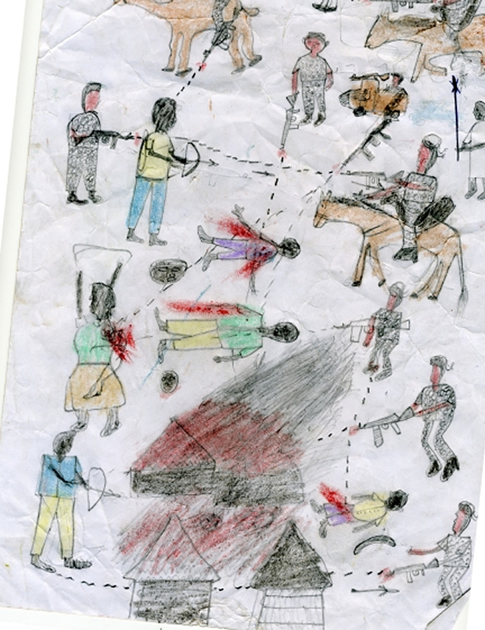
April 16: Yale researchers confirm nine RSF arson attacks on villages west of El Fasher. The Sudanese Missing People Initiative reports a total of 990 enforced disappearance cases since the start of the SAF-RSF war last year. The US envoy for Sudan tells Radio Dabanga that he hopes the Jeddah talks between the SAF and RSF will resume in May. Former PM and current chair of the Civil Democratic Forces (Tagadom) Abdalla Hamdok meets French President Emmanuel Macron in a closed session in Paris.
April 17: Displaced Darfuri renew their call to the world to save them. El Burhan replaces Sudan’s Foreign Affairs Minister and the governors of Kassala and El Gedaref. US analyst Cameron Hudson says he does not expect that the Jedda talks will yield positive results.
April 18: Battles between the army and the RSF continue unabated in several parts of the country.
April 19: According to the UN Food and Agriculture Organization (FAO) the upcoming planting season forms ‘a window of opportunity’ to prevent famine in Sudan.
April 20: Massive demonstrations take place in Port Sudan, Kassala, and El Gedaref denouncing racist statements of a former GIS director about three former eastern Sudanese officials. Sennar state starts measles vaccination campaign targeting more than a million children.
April 21: Military Intelligence and GIS agents detain six activists, including an imam, in Sennar and El Gedaref within two weeks. The Sudanese de facto government in Pot Sudan announces that the country’s gold exports surge, exceeding $428 million. The UAE objects to the UN Security Council over Sudan’s “baseless” accusations that Abu Dhabi is supplying the RSF with weapons.
April 22: The Red Cross president laments the world’s ‘failure to protect civilians in armed conflict’. The UN High Commissioner for Refugees (UNHCR) in Sudan announces the completion of humanitarian aid projects funded by Japan.
April 23: The IOM displacement matrix reports that within 16 days more than 40,000 people have been displaced by SAF-RSF fighting in El Fasher, North Darfur. The SAF says it shot down two drones above Shendi in River Nile state. Sudanese teachers call for education to resume. The EU ambassador to Sudan urges ‘press protection and humanitarian access’ in the country. Refugees International warns that the RSF is about to launch fierce attacks on El Fasher.
April 24: The Sudanese Journalists Syndicate denounces threats directed at journalist Samar Suleiman in Kassala. South Darfur starts an immunisation vaccination campaign for children in one third of the state.
April 25: Desperate Sudanese refugees in Amhara, Ethiopia, demand evacuation to a safer area. The New Humanitarian reports that thousands of Sudanese refugees in Egypt have been detained by Egyptian authorities in secret military bases. The Strategic Initiative for Women in the Horn of Africa (SIHA) Network reports on ‘the aftermath of rape’ in Sudan.
April 26: Seven herders and more than 250 camels are killed in an air strike by the Sudanese Air Force near Mellit, North Darfur capital of El Fasher. Former governor of Kassala Saleh Ammar tells Radio Dabanga that the ‘eastern Sudanese have overcome their conflicts’.
April 27: The Sudanese army says it repelled drone attacks targeting Merowe Airport in Northern State. The UN Security Council expresses ‘deep concern’ about the situation in El Fasher and calls on the warring parties to immediately halt attacks on the city.
April 28: Resistance committees in Wad Madani, the capital of El Gezira, report a new wave of RSF violence against villages in the state. The RSF continue to besiege El Obeid, the North Kordofan capital, and to raise levies on the roads leading to the city. An economic analyst recommends further regulation of gold exports is needed.
April 29: Yale research shows that an additional 11 villages near El Fasher were razed by ‘apparent arson’ between April 20-25. Toby Harward, deputy UN Humanitarian Coordinator for Sudan, warns of a major conflict looming over El Fasher. The UN Security Council convenes a closed session in New York to address the situation in the North Darfur capital. The authorities in Atbara, River Nile state expel displaced sheltering in two schools in the town.
April 30: Chadian forces storm the border town of Um Dukhun in Central Darfur, controlled by the RSF.
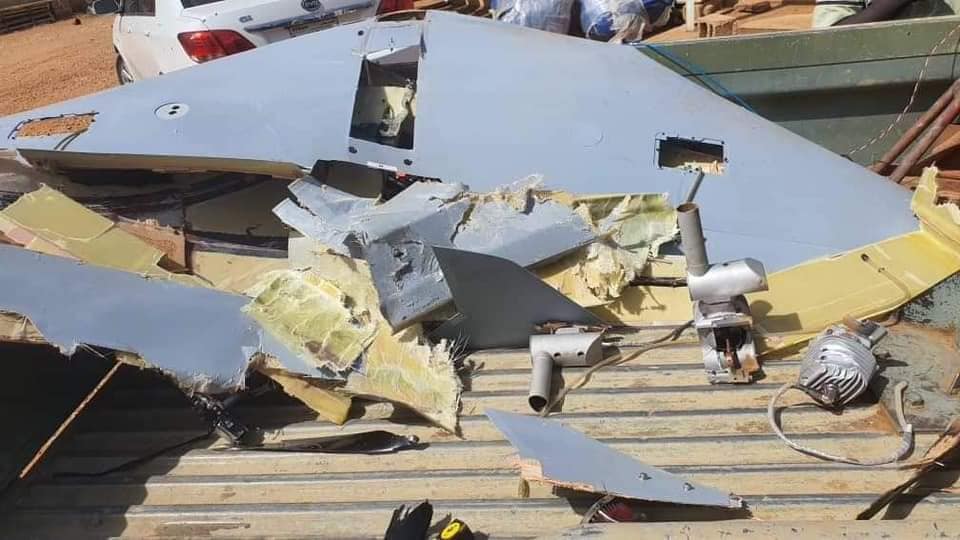
May: US Special Envoy for Sudan Tom Perriello says that despite the severity of the crisis, Sudan remains largely overlooked by the international community. The Famine Early Warning Systems Network (FEWS NET) warns of famine in Sudan if the people’s access to food does not improve. Malnourished children are dying in Darfur camps. UN agencies warn that ‘Sudan risks a lost generation, with grave implications for the country’s future‘. Pro-SAF political blocs sign a charter in Cairo on governance in Sudan after the war. The Tagadom founding conference concludes successfully, after heated discussions over the formation of a new government. This month also sees a new wave of unlawful detentions and extrajudicial killings by Military Intelligence, the security apparatus, or the RSF, of activists in the country.
May 1: In a testimony before the Senate Foreign Relations Committee in Washington DC yesterday, US Special Envoy for Sudan Tom Perriello issues a stark warning about the dire humanitarian crisis in Sudan. SpaceX is poised to imminently terminate Starlink satellite internet services within Sudan.
May 2: Two ICRC drivers are killed in an attack by gunmen in South Darfur. The SIHA Network demands an end to RSF siege of Tuti Island in Khartoum.
May 3: The FEWS NET Food Security Alert warns of imminent Famine (IPC Phase 5) in Sudan. Sudanese journalists brave conflict on World Press Freedom Day.
May 4: A child was killed and two others are injured in two separate detonations of explosive remnants of war (ERWs) in Nyala, South Darfur. The RSF siege of El Fasher leads to food and medicine shortages for its about 800,000 residents. The SPLM-N El Hilu and the SAF agree in Juba to jointly facilitate delivery of aid in South Kordofan. The Sudanese Journalists Syndicate says that reporters are targeted by both sides in the war.
May 5: Military Intelligence in El Gedaref detain nine political activists. People from West Darfur continue to flow into Chad, while those already sheltering in refugee camps report dire humanitarian conditions.
May 6: The Sudanese Air Force bombs RSF targets in the southern part of North Kordofan. The warring parties are using fake social media accounts to spread false news, hate speech, and racism, says Dabanga Editor-in-Chief Kamal Elsadig.
May 7: Heavy battles between the army and the RSF are reported from Mount Kordofan in the south of North Kordofan. The Tagadom alliance says that the SAF and RSF should return to the negotiation table ‘without conditions’.
May 8: A group of 48 Sudanese political blocs backing the SAF sign a charter in Cairo outlining their vision to manage the transitional period after the war. The UN World Food Programme (WFP) welcomes EU donations of €117 million and €185 million to avert a humanitarian catastrophe in Sudan and neighbouring countries.
May 9: The Sudanese Pound continues its rapid decline and economists expect the collapse of 25 banks in Sudan. According to a new Human Rights Watch (HRW) report, the RSF’s ‘methodical destruction’ in West Darfur ‘amounts to genocide’.
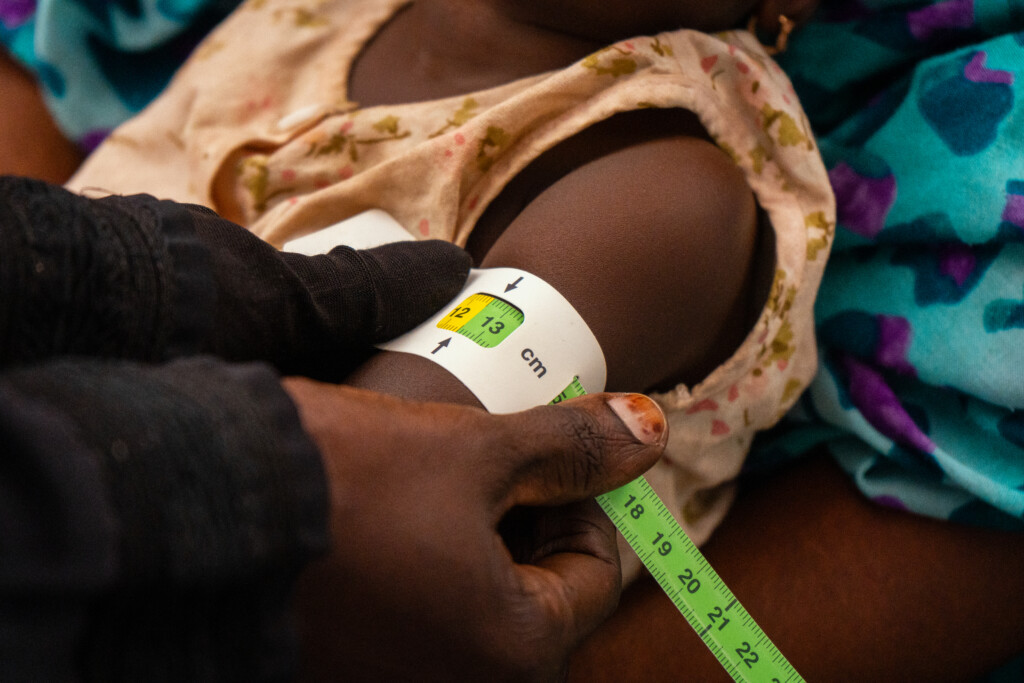
May 10: Counterfeit and expired medicines are being sold on Sudanese markets.
May 11: USAID calls on Sudan’s junta for ‘immediate action to lift impediments to humanitarian aid operations’. London youth protest the ‘media neglect’ of the Sudanese war.
May 12: In camps for displaced people in Darfur, children are dying of malnutrition. The old Republican Palace building is set ablaze by a SAF airstrike, while at least 40 people are killed in attacks in various places in the country. El Fasher is witnessing SAF-RSF fighting in the east and north of the city for the third day. The African Centre for Justice and Peace Studies (ACJPS) issues a damning report on human rights atrocities during the more than one-year old war. A new wave of unjustified detentions and extrajudicial killings of activists is taking place these days.
May 13: Experts question the Central Bank of Sudan’s ability to control export revenues.
May 14: The Internal Displacement Monitoring Centre (IDMC) states that Sudan tops the global displacement crisis. The US Ambassador to the UN warns of an imminent ‘large-scale massacre’ in El Fasher. US Envoy Tom Perriello, touring the region ‘to advance efforts to end the conflict in Sudan’, discusses the situation with rebel leader El Hadi Idris in Kampala.
May 15: ‘Time is running out… We need action now’, the UN Humanitarian Coordinator for Sudan says. A fresh round of US sanctions targets two RSF commanders. El Fasher witnesses renewed airstrikes for the second consecutive day. The Sudanese Transparency and Policy Tracker (STPT) reports that the RSF is using Mellit in North Darfur as a base to control trade in the region. Beja leaders are working on tribal reconciliation, as militarisation of civilians in eastern Sudan continues.
May 16: Community leaders in the North Kordofan capital of El Obeid agree with the RSF to reopen the road linking the city with White Nile state.
May 19: The RSF recaptures Um Rawaba in the southern part of North Kordofan. SAF airstrikes devastate Nyala, RSF bomb neighbourhoods, a hospital, and the Abu Shouk camp in El Fasher, and battles are reported from Khartoum and El Gezira. The British foreign secretary is appalled by the violence in and around El Fasher.
May 20: The ACJPS reports a surge in rape-related pregnancies in Sudan. A former UN official says that the war can be halted by controlling Sudan’s livestock trade with the Gulf. The school year resumes in several parts of Sudan, which means that shelter centres in the schools will no longer be as available.
May 21: The Sudanese Air Force bombs the El Jeili Oil Refinery north of Khartoum. Rebel leader El Taher Hajar protests his ‘unconstitutional dismissal’ by El Burhan from the Sovereignty Council.
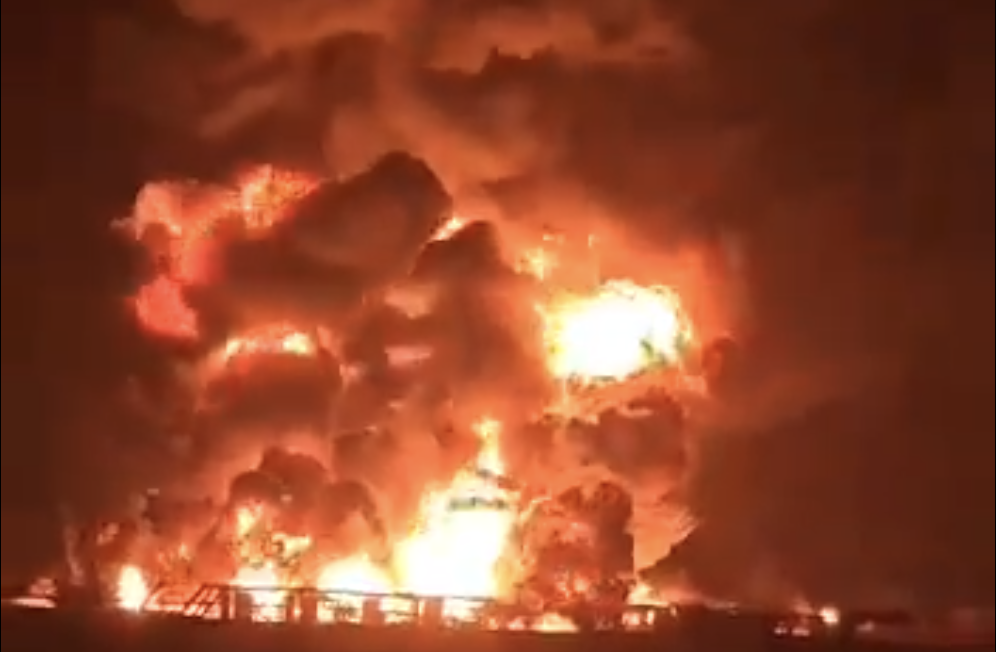
May 22: More than 100 displaced people, including 66 children, recently died of malnutrition and diseases in the large Kalma camp in South Darfur. The Sudanese Air Force bombing of RSF-held Kabkabiya, North Darfur, kills at least 16 people. North Kordofan activists warn of a ‘looming humanitarian catastrophe’ in Um Rawaba. The UN Special Advisor on the Prevention of Genocide briefs the Security Council on the ‘alarming situation’ in Sudan. Residential real estate rent prices in Port Sudan are soaring amid renewed Iranian diplomatic presence.
May 24: The Sudanese Together Against Rape and Sexual Violence campaign launches an initiative to pressure the warring parties to commit to prohibiting sexual violence by their members. Experts warn that the destruction of the El Jeili Oil Refinery may have disastrous consequences for the environment.
May 25: Many more residents of El Fasher are fleeing the intensified SAF-RSF battles for the city. A staff member of Médecins Sans Frontières team (MSF) in El Fasher is killed by a shell. Kidney failure patients in Port Sudan protest the Ministry of Health’s failure to allocate dialysis machines received through foreign aid. The authorities in Port Sudan are reportedly working on a new constitutional framework for a new government. The RSF denies plans to set up an independent state in western Sudan. The junta is also strengthening its relations with Russia and Iran.
May 26: The El Gedaref Ministry of Health reports a significant increase in kala-azar rates.
May 27: The awaited founding conference of the Civil Democratic Forces alliance (Tagadom) kicks off in Addis Ababa. The Sudanese Air Force continues its airstrikes on RSF sites in and around El Fasher.
May 28: SAF-RSF clashes over the North Darfur capital continue and a SAF airstrike sets a hospital in nearby Kutum on fire.
May 29: The UN secretary-general’s personal envoy to Sudan discusses UN’s role in addressing the Sudanese crisis with El Burhan in Port Sudan. The secretary-general of the SPLM-N El Hilu says that Sudan is ‘teetering on the edge of total collapse’.
May 30: Three large UN agencies warn that ‘Sudan risks a lost generation, with grave implications for the country’s future‘. The Tagadom founding conference concludes in Addis Ababa with the approval of a political paper and confirmation of Abdalla Hamdok as chair.
May 31: The UN Inter-Agency Standing Committee warns that ‘time is running out for millions of people in Sudan’.
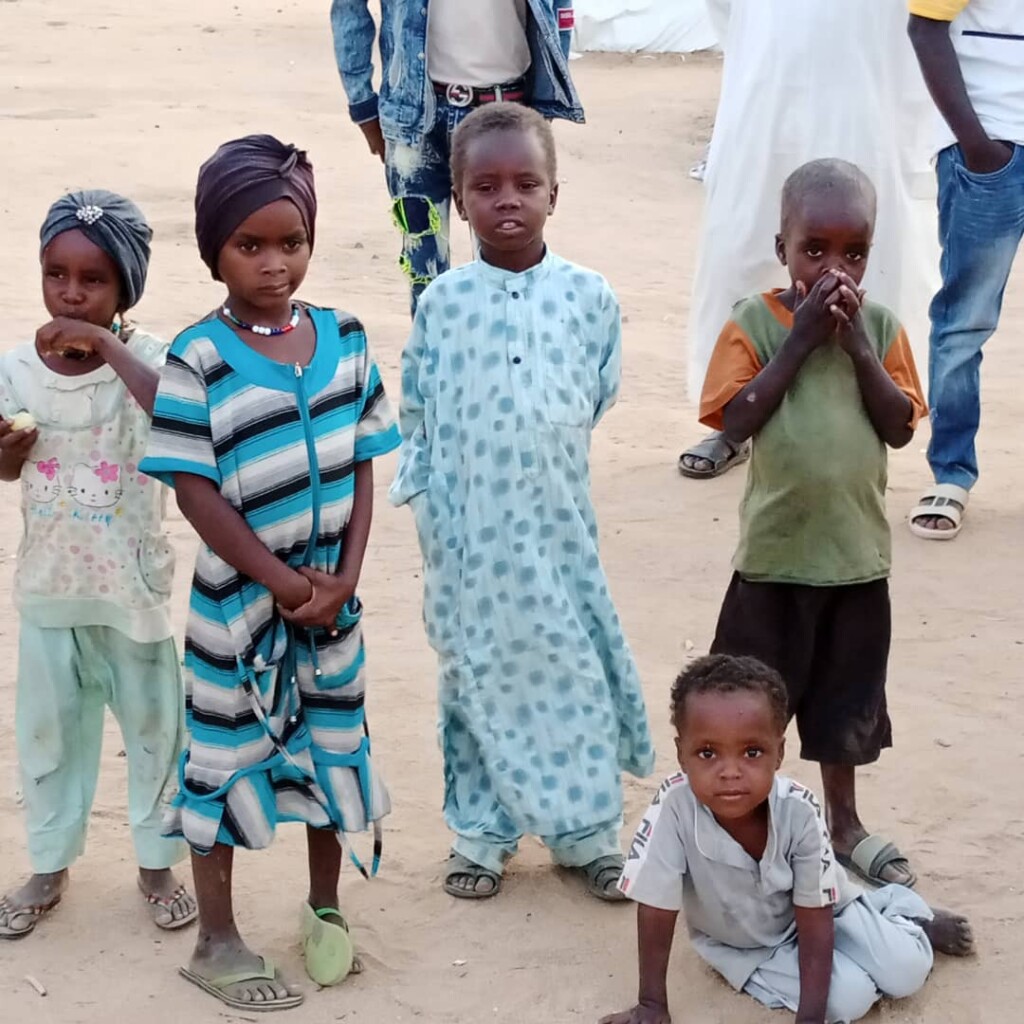
June: The RSF fighting for control over the North Darfur capital El Fasher continues unabated, killing dozens of people, and causing thousands to flee the city. The RSF are still creating havoc in El Gezira. On one day, more than 100 people of the same village were killed. Three international reports flag Sudan as one of the highest concern ‘hunger hotspots’. The WFP scales up its emergency response to avert famine in Sudan. Three international reports flag Sudan as one of the largest ‘hunger hotspots’. Child malnutrition in the large South Darfur Kalma camp surges as resources dwindle.
June 1: The Tagadom conference prompts mixed responses in Sudan.
June 2: Pope Francis calls for peaceful dialogue in Sudan. The German government grants US$12 million to support agriculture in eastern Sudan. At least 12 are killed by shells in El Fasher. RSF-allied gunmen plunder trucks on North Kordofan roads.
June 3: A high-level Sudanese government delegation attends the St Petersburg Economic Forum.
A civil servant charged with ‘undermining the constitutional order’ and a young woman accused of cooperating with the RSF are sentenced to death. The National Medical Supplies Fund airdrops medicines into El Fasher.
June 4: More than 27,000 people have recently sought refuge in Jebel Marra, Central Darfur. A human rights defender warns that with both warring parties accusing civilians of aligning with the opposition, the risk for those who speak out against the war is growing.
June 5: RSF elements kill more than 100 people in Wad El Noura village in El Gezira.
June 6: The indiscriminate RSF shelling of the North Darfur capital continues unabated. The WFP is scaling up to provide life-saving food aid to an additional five million people in Sudan by the end of this year. ‘Technical problems’ lead to closure of the dialysis centre in Ed Debba, Northern State.
June 7: The SAF shoots down four drones above Kosti and Kenana in White Nile state and two near the Wadi Sayedna army base in Omdurman.
June 8: RSF soldiers kill staff and patients in the El Fasher Southern Hospital, while three children die by RSF artillery strikes in the Abu Shouk camp, north of the city. The RSF release 739 detained SAF members and police forces.
June 9: According to former rebel leader and prominent Tagadom member Yassir Arman ‘the Russian Red Sea base and an RSF ‘government’ in Darfur will prolong war and condemn Sudan’. A Sudanese Ba’ath party leader warns that both warring parties seek ‘to narrow the public discourse on the conflict’.
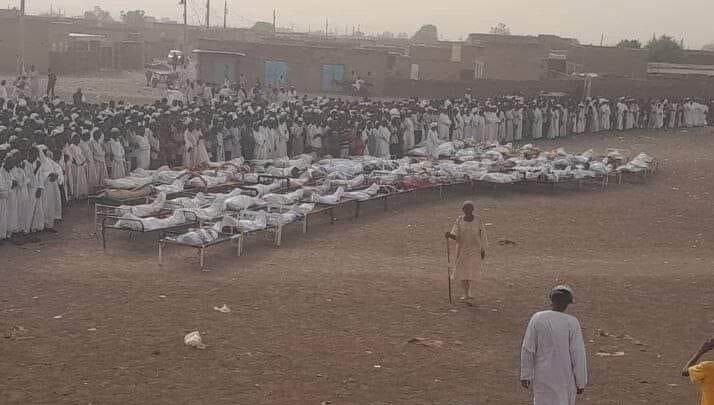
June 10: Three international reports flag Sudan as one of the highest concern ‘hunger hotspots’. Child malnutrition in the large South Darfur Kalma camp surges as resources dwindle. Shortage of funds threatens a good harvest in the Nuba Mountains in South Kordofan. A heatwave kills dozens of Sudanese crossing the border to Egypt illegally. US ambassadors highlight the Sudan crisis at home and abroad.
June 11: Eight soup kitchen volunteers are killed in renewed fierce battles in El Fasher. The International Criminal Court (ICC) will step-up its investigations into crimes allegedly committed during the war in Sudan and in particular in Darfur. The National Umma Party condemns arbitrary detentions by Military Intelligence.
June 12: Cairo host a meeting of the Arab League seeking to ‘harmonise’ the Sudan peace efforts. Security agents continue to arbitrarily detain activists in White Nile state, accusing them of being RSF collaborators.
June 13: The UN Security Council adopts a resolution demanding the RSF cease its blockade on El Fasher.
June 15: US Envoy Perriello warns Sudan factions to ‘negotiate peace or face international intervention’. UN officials hope the new UNSC resolution ‘will alleviate suffering’ in the North Darfur capital. Egypt deports more Sudanese, as bureaucracy makes asylum ‘nearly impossible’.
June 16: The National Umma Party (NUP) issues a warning about the dire state of Sudan’s agricultural sector and the ‘looming threat of famine’.
June 17: Satellite imagery investigated by the Centre for Information Resilience (CIR) shows over 50 residential areas repeatedly scorched in North Darfur.
June 18: The UN Office for the Coordination of Humanitarian Affairs (OCHA) warns the UNSC that the humanitarian crisis in Sudan continues to spiral into chaos. Saudi Arabia renews its call for dialogue to pave the way for a political solution in Sudan.
June 19: A journalist is detained by a force from the Sudan Liberation Movement faction led by Darfur Governor Minni Minawi (SLM-MM) in El Fasher.
June 20: A new report of the Sudanese Transparency and Policy Tracker (STPT) brings to light the profound impact of the war on women.
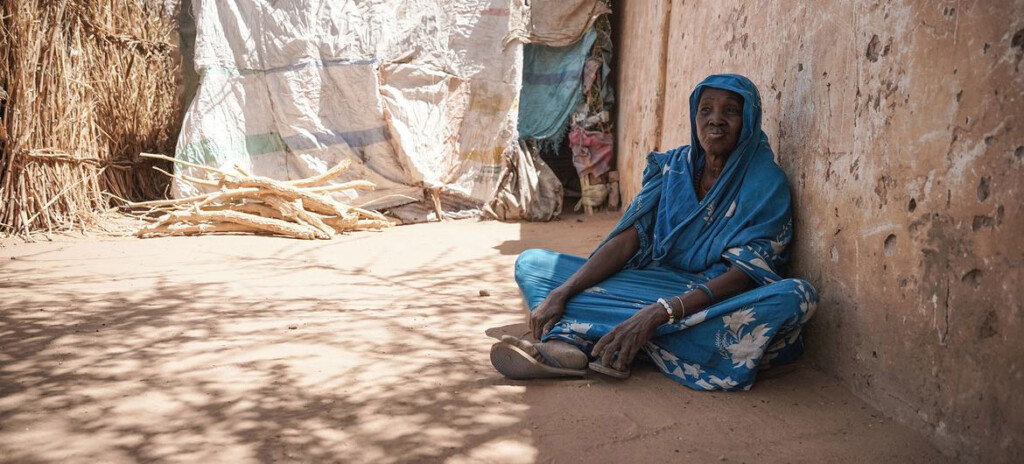
June 21: The Peace and Security Council of the African Union proposes an extraordinary summit on Sudan. A group of 60 civil society organisations call on the international community to urgently meet the financial pledges they made in Paris on April 15.
June 22: Médecins Sans Frontières (MSF) calls for protection of hospitals in El Fasher to ensure that they can continue to offer medical aid.
June 23: RSF accuses the Sudanese army of bombing the Khartoum North power station. The No to Women’s Oppression initiative urges the international community to resolve the crisis of Sudanese refugees stranded in the forests of Ethiopia. The European Union sanctions six entities accused of ‘destabilising Sudan’s political landscape’. The RSF shell the last remaining dialysis centre in El Fasher.
June 24: Radio Dabanga receives reports about incommunicado detentions of a member of the Communist Party in northern Sudan and a human rights defender in Darfur.
June 25: The UAE suspends ‘emergency’ residence permits for Sudan refugees. Egypt postpones studies in Sudanese schools.
June 26: At least six malnourished children die each month in El Sareif camp near Nyala. El Fasher witnesses renewed artillery shelling by the RSF.
June 27: Former Sudan FM Maryam El Sadig proposes a civil-led ‘third way’ to end the war.
June 28: The situation in the Abu Shouk camp, north of El Fasher, has become ‘intolerable’.
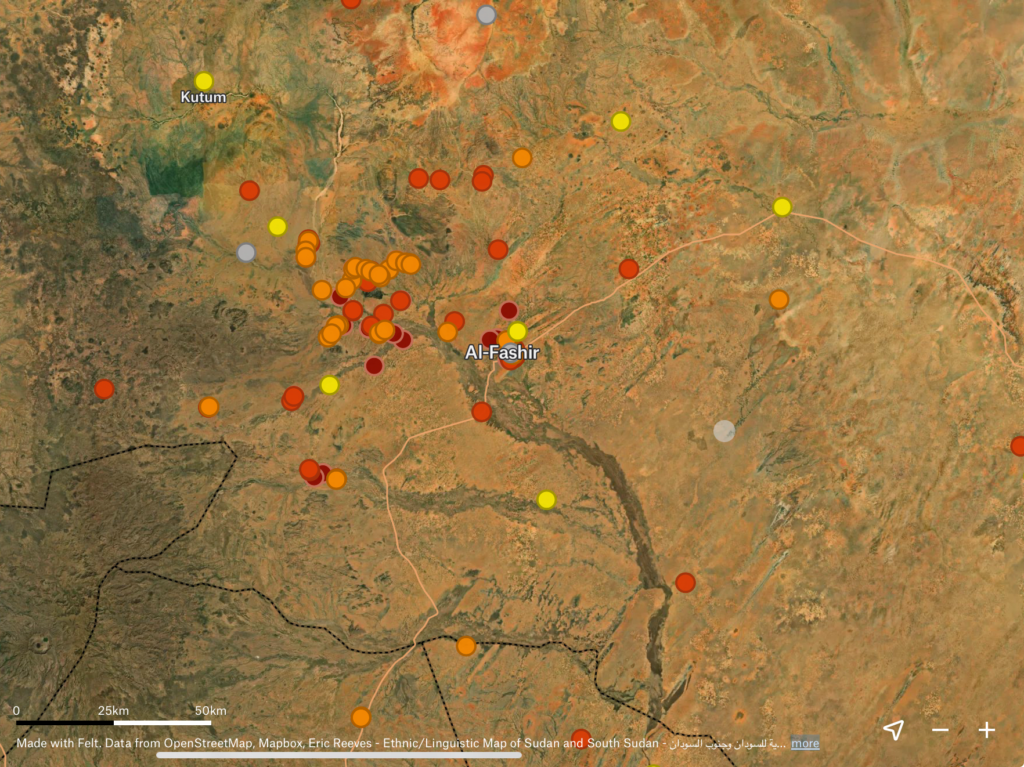
June 29: The RSF announces its control over Singa, the capital of Sennar, as Military Intelligence officers detain activists in the state. The UAE again denies supplying arms to the RSF, after having granted $20 million for Sudan war victims.
June 30: More than 50,000 people in Singa have fled the RSF-SAF fighting, the Sudanese Air Force launches airstrikes on the city. The RSF seizes the 67th Infantry Brigade site, the last SAF stronghold in Singa. More people are fleeing Sennar following rumours about RSF advances. Security agents briefly detain an activist in South Kordofan to question her about her contacts with the SPLM-N El Hilu.
Previous timelines
Sudan timeline January-March 2024: Sudan becomes ‘the largest humanitarian crisis in the world’
Sudan timeline October-December 2023: War deepens Sudan’s suffering
Sudan timeline July-September 2023: Sudanese ‘in survival mode’
Sudan timeline April-June 2020: Covid-19 marks all aspects of life, inflation soars
Sudan timeline January-March 2020: Little relief to the country’s economic, security woes
Sudan timeline October-December 2019: Interim government put to the test
Sudan timeline July-September 2019: Turbulent transformation from tyranny







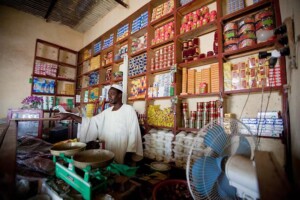



 and then
and then